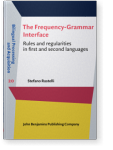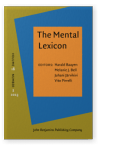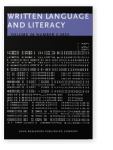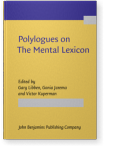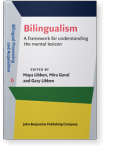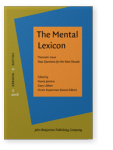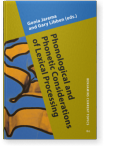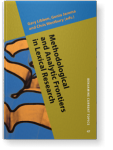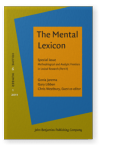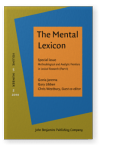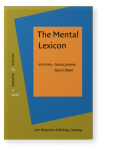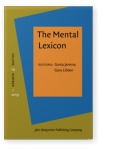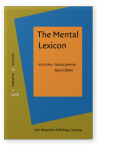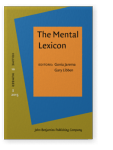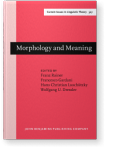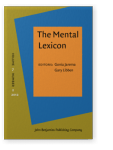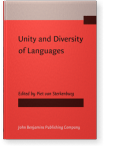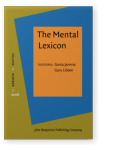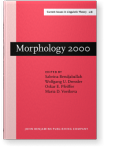Gary Libben
List of John Benjamins publications for which Gary Libben plays a role.
Book series
Journals
The Mental Lexicon (ML)
Edited by Harald Baayen, Melanie J. Bell, Juhani Järvikivi and Vito Pirrelli
ISSN 1871-1340 | E-ISSN 1871-1375
Polylogues on The Mental Lexicon: An exploration of fundamental issues and directions
Edited by Gary Libben, Gonia Jarema and Victor Kuperman
[Not in series, 238] 2021. viii, 229 pp.
Subjects Cognition and language | Morphology | Psycholinguistics | Semantics | Theoretical linguistics
Bilingualism: A framework for understanding the mental lexicon
Edited by Maya Libben, Mira Goral and Gary Libben
[Bilingual Processing and Acquisition, 6] 2017. xvii, 252 pp.
Subjects Morphology | Multilingualism | Psycholinguistics | Semantics
New Questions for the Next Decade
Edited by Gonia Jarema, Gary Libben and Victor Kuperman
Special issue of The Mental Lexicon 11:3 (2016) v, 165 pp.
Subjects Computational & corpus linguistics | Multilingualism | Neurolinguistics | Psycholinguistics | Semantics
Phonological and Phonetic Considerations of Lexical Processing
Edited by Gonia Jarema and Gary Libben
[Benjamins Current Topics, 80] 2015. ix, 233 pp.
Subjects Cognition and language | Phonetics | Phonology | Psycholinguistics | Semantics
Methodological and Analytic Frontiers in Lexical Research
Edited by Gary Libben, Gonia Jarema and Chris Westbury
[Benjamins Current Topics, 47] 2012. x, 465 pp.
Subjects Cognition and language | Lexicography | Psycholinguistics
Methodological and Analytic Frontiers in Lexical Research (Part II)
Edited by Gonia Jarema, Gary Libben and Chris Westbury
Special issue of The Mental Lexicon 6:1 (2011) v, 196 pp.
Subjects Computational & corpus linguistics | Multilingualism | Neurolinguistics | Psycholinguistics | Semantics
Methodological and Analytic Frontiers in Lexical Research (Part I)
Edited by Gonia Jarema, Gary Libben and Chris Westbury
Special issue of The Mental Lexicon 5:3 (2010) v, 188 pp.
Subjects Computational & corpus linguistics | Multilingualism | Neurolinguistics | Psycholinguistics | Semantics
2021 Chapter 1. The mental lexicon as polylogue Polylogues on The Mental Lexicon: An exploration of fundamental issues and directions, Libben, Gary, Gonia Jarema and Victor Kuperman (eds.), pp. 1–16 | Chapter
2020 Can the maze task be even more amazing? Adapting the maze task to advance psycholinguistic experimentation The Mental Lexicon 15:2, pp. 366–383 | Article
The maze task (Forster, Guererra & Elliot, 2009; Forster, 2010) is designed to measure focal lexical and sentence processing effects in a highly controlled manner. We discuss how this task can be modified and extended to provide a unique opportunity for the investigation of lexical effects in… read more
2019 No lab, no problem: Designing lexical comprehension and production experiments using PsychoPy3 The Mental Lexicon 14:1, pp. 152–168 | Article
We present new opportunities for psycholinguistic research that are made available by presenting experiments online over the web. We focus on PsychoPy3, which is a new version of a system for the development and delivery of behavioural experiments. Crucially, it allows for both these functions… read more
2018 What does constituent priming mean in the investigation of compound processing? The Mental Lexicon 13:2, pp. 269–284 | Article
Most dictionary definitions for the term compound word characterize it as a word that itself contains two or more words. Thus, a compound word such as goldfish is composed of the constituent words gold and fish. In this report, we present evidence that compound words such as goldfish might not… read more
2017 Morphological integration and the bilingual lexicon Bilingualism: A framework for understanding the mental lexicon, Libben, Maya, Mira Goral and Gary Libben (eds.), pp. 197–216 | Chapter
In English, as in most of the world’s languages, the majority of words are multimorphemic. In the psycholinguistic literature on lexical processing in bilinguals, however, multimorphemic words have thus far received relatively little treatment. In this chapter, we discuss the opportunities that the… read more
2017 The dynamic lexicon: Complex words in bilingual minds Bilingualism: A framework for understanding the mental lexicon, Libben, Maya, Mira Goral and Gary Libben (eds.), pp. 1–6 | Introduction
2015 The integration of phonological and phonetic processing: A matter of sound judgment Phonological and Phonetic Considerations of Lexical Processing, Jarema, Gonia and Gary Libben (eds.), pp. 1–14 | Article
2015 Segmented binaural presentation as a means to examine lexical substructure The Mental Lexicon 10:3, pp. 435–457 | Article
We present an auditory presentation technique called segmented binaural presentation. The technique builds on the dichotic listening paradigm (Shankweiler & Studdert-Kennedy, 1967; Studdert-Kennedy & Shankweiler, 1970) and segmented lexical presentation (Libben, 2003; Betram, Kuperman, Baayen, &… read more
2014 Semantic transparency, compounding, and the nature of independent variables Morphology and Meaning: Selected papers from the 15th International Morphology Meeting, Vienna, February 2012, Rainer, Franz, Francesco Gardani, Hans Christian Luschützky and Wolfgang U. Dressler (eds.), pp. 205–222 | Article
We report on a psycholinguistic study of semantic transparency among English compound words. We employed the P3 technique (Libben et al. 2012), which combines elements of three experimental paradigms: progressive demasking, naming, and word typing. Both the progressive demasking data and the word… read more
2012 The challenge of embracing complexity Methodological and Analytic Frontiers in Lexical Research, Libben, Gary, Gonia Jarema and Chris Westbury (eds.), pp. 1–12 | Article
2012 P3: A technique for the study of perception, production, and participant properties The Mental Lexicon 7:2, pp. 237–248 | Article
By combining lexical recognition paradigms and written production it is possible to efficiently investigate the roles of perception, production, and participant properties in lexical processing. We report on an approach to experimentation that generates a rich set of dependent variables associated… read more
2008 Words, mind and brain Unity and Diversity of Languages, Sterkenburg, Piet van (ed.), pp. 111–121 | Article
2006 Introduction The Mental Lexicon 1:1, pp. 1–2 | Miscellaneous
2002 17. Is there a morphological parser? Morphology 2000: Selected papers from the 9th Morphology Meeting, Vienna, 24–28 February 2000, Bendjaballah, Sabrina, Wolfgang U. Dressler, Oskar E. Pfeiffer and Maria D. Voeikova (eds.), pp. 213–225 | Chapter
